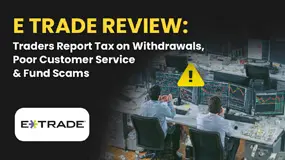简体中文
繁體中文
English
Pусский
日本語
ภาษาไทย
Tiếng Việt
Bahasa Indonesia
Español
हिन्दी
Filippiiniläinen
Français
Deutsch
Português
Türkçe
한국어
العربية
Oil can reach $100; what does it mean for markets and inflation?
Abstract:How heavily will oil move the markets?

More and more analysts are sure Brent oil will surpass $100 a barrel. Some of them forecast that $125 and $150 levels will be reached over several months. As oil is one of the most (if not the most) traded commodities in the world, it can't help but impact inflation and financial markets. At least, people think so. So how heavily will oil move the markets, and what will the direction of the movement be? Let's find out!
The correlation of oil and stock market
An increase in oil prices usually lowers the expected economic growth rate and increases inflation expectations over shorter horizons. Decreasing economic growth prospects, in turn, reduces companies' earnings expectations, resulting in a dampening effect on stock prices. But that's in theory. So let's look at the correlation meter to find out the truth.

Here you can see S&P500 (US500) index (orange) compared with XBR/USD (UK Brent oil, blue). In addition, you can find a correlation meter at the bottom of the screen, a tool to measure the correlation between instruments and assets. It is evident that since the crash in March 2020, both US500 and XBR/USD have had a positive correlation. It is opposite to the market expectations of oil and stock price movement and shows that high oil prices don't always mean a slump in stocks.
The truth about oil
We searched the web and found out that researchers at the Federal Reserve Bank of Cleveland looked at movements in the price of oil and stock market prices and discovered that there is little correlation between oil prices and the stock market.
Also, it would be best if you separate correlation and causation. Oil does impact the US economy, but this impact is bidirectional. On the one hand, high oil prices create more jobs in the oil industry and increase investments in shale oil deposits. On the other hand, high oil prices also hit businesses and consumers with higher transportation and manufacturing costs. To be more specific, we can assume that change in oil prices causes money transfer from energy-consuming companies to oil production and vice versa. Oil doesn't drive stock prices because other price factors in the economy—such as wages, interest rates, industrial metals, plastic, and computer technology—can offset changes in energy costs.
In other words, the economy is too complex to expect one commodity to drive all business activity in a predictable way.
What to expect now?
Technically, oil is in a consolidation. A breakout of the $93.00 level will turn on the bullish scenario. However, considering the negative correlation with US500 at the present moment, the latter may decrease even more. The oil may move higher to the resistance of $91.00 per barrel in the short term.
XBR/USD H4 chart
Resistance: 91.00, 93.00, 95.00;
Support: 88.00, 86.00, 81.00

Disclaimer
This post is written and submitted by FBS Markets for informational purposes only. In no way shall it be interpreted or construed to create any warranties of any kind, including an offer to buy or sell any currencies or other instruments.
The views and ideas shared in this article are deemed reliable and based on the most up-to-date and trustworthy sources. However, the company does not take any responsibility for accuracy and completeness of the information, and the views expressed in the article may be subject to change without prior notice.

Disclaimer:
The views in this article only represent the author's personal views, and do not constitute investment advice on this platform. This platform does not guarantee the accuracy, completeness and timeliness of the information in the article, and will not be liable for any loss caused by the use of or reliance on the information in the article.
Read more

Can These Five Brokers boost your wealth?
Choosing a reliable broker can directly impact your long-term profitability. WikiFX evaluates a broker’s safety, regulatory compliance, and service quality. According to WikiFX’s latest ratings, the following five brokers consistently achieve higher scores than many competitors. Whether you're a beginner or a seasoned investor, these well-regulated, reputable platforms may help you trade with greater confidence and potentially boost your wealth.

E TRADE Review: Traders Report Tax on Withdrawals, Poor Customer Service & Fund Scams
Has your E Trade forex trading account been charged a withholding tax fee? Did your account get blocked because of multiple deposits? Did you have to constantly call the officials to unblock your account? Failed to open a premium savings account despite submitting multiple documents? Is fund transfer too much of a hassle at E Trade? Did you find the E Trade customer support service not helpful? In this E Trade review article, we have shared certain complaints. Take a look!

mBank Exposed: Top Reasons Why Customers are Giving Thumbs Down to This Bank
Do you find mBank services too slow or unresponsive? Do you find your account getting blocked? Failing to access your account online due to several systemic glitches? Can’t perform the transactions on the mBank app? Do you also witness inappropriate stop-level trade execution by the financial services provider? You are not alone! Frustrated by these unfortunate circumstances, many of its clients have shared negative mBank reviews online. In this article, we have shared some of the reviews. Read on!

In-Depth Uniglobe Markets Commission Fees and Spreads Analysis – What Traders Should Really Know
For experienced traders, the cost of execution is a critical factor in broker selection. Low spreads, fair commissions, and transparent pricing can be the difference between a profitable and a losing strategy over the long term. This has led many to scrutinize the offerings of brokers like Uniglobe Markets, which presents a tiered account structure promising competitive conditions. However, a professional evaluation demands more than a surface-level look at marketing claims. It requires a deep, data-driven analysis of the real trading costs, set against the backdrop of the broker's operational integrity and safety. This comprehensive Uniglobe Markets commission fees and spreads analysis will deconstruct the broker's pricing model, examining its account types, typical spreads, commission policies, and potential ancillary costs. Using data primarily sourced from the global broker inquiry platform WikiFX, we will provide a clear-eyed view of the Uniglobe Markets spreads commissions prici
WikiFX Broker
Latest News
In-Depth Uniglobe Markets Commission Fees and Spreads Analysis – What Traders Should Really Know
WikiFX's New Evaluation of ATM Capital LTD: Does its License Protect the Arab Investor?
Is Axi Legit? A Data-Driven Analysis of Its Regulatory Standing and Trader Feedback
How a Fake Moomoo Ad Led to the “New Dream Voyage 5” Scam
FXPesa Review: Are Traders Facing High Slippage, Fund Losses & Withdrawal Denials?
Trive Investigation: High Score, Hidden Risk - The Profit Paradox
CMC Markets Australia Revenue Surges 34%, But High-Net-Worth Clients Face Tax Phishing Threat
The 350 Per Cent Promise That Cost Her RM604,000
"Just 9 More Lots": Inside the Endless Withdrawal Loop at Grand Capital
GCash Rolls Out Virtual US Account to Cut Forex Fees for Filipinos
Currency Calculator



